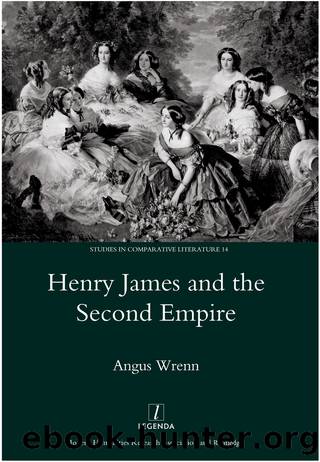Henry James and the Second Empire by Angus James Wrenn

Author:Angus James Wrenn [Wrenn, Angus James]
Language: eng
Format: epub
Tags: Literary Criticism, European, General
ISBN: 9781906540074
Google: AYb_lJabNHEC
Publisher: MHRA
Published: 2009-09-15T20:45:01+00:00
CHAPTER 4
Octave Feuillet
Of the five authors considered in this study it is Octave Feuillet (1821â90) who most clearly epitomizes the Second Empire. Edmond About's position is complicated by his professed anticlericalism, and by the fact that he pretended to be a radical critic of the regime while simultaneously being judged by his opponents to be in its pay. Cherbuliez's politics may have been less equivocal than About's, but his status as a Swiss immigrant, and moreover a Calvinist Protestant, to some extent set him apart within a French context. Where the Goncourts'Journal dismisses About, the self-made man, as an arriviste, boasting of his chateau and his numerous servants, Feuillet was a genuine Scion of aristocratic circles, being, along with his wife, one of the most intimate members of the court of Napoleon III. Feuillet throughout his career maintained his opposition to naturalism in literature, even in the 1870s and 1880s, after the demise of the Second Empire, when Zola and the Goncourts held unchallenged sway. Unlike Cherbuliez in the 1880s, Feuillet never veered from 'idealism' and dabbled in naturalism, while Feuillet's religious position as a Catholic remained conservative and conventional. The most far-reaching study of Feuillet yet produced, Astrid Grewe's Die Literatur der Krinoline (1974) makes it clear that Feuillet's aesthetic and political conservatism went hand in hand. This book's absence from the scholarly literature in the English-speaking world (it has never been translated) has led to a whole dimension of Feuillet's work being omitted from the accounts of Feuillet's influence upon James given by Adeline Tintner and Pierre Walker. Feuillet thus functions as an evocation in James's work, not just of French literature in general, but of a specific genre of mid-nineteenth-century French fiction, and James's evocation of Feuillet at a crucial juncture in his own career is of the greatest significance. It is therefore worth summarizing the career and background of this writer, today long since forgotten, both in France and abroad.
Octave Feuillet was born on 11 August 1821 at Saint-Lô in Normandy, the second son of Jacques Feuillet, who was a senior civil servant in the local government administration. In his biography La Jeunesse d'Octave Feuillet (1922) Henry Bordeaux describes a difficult relationship between Octave Feuillet (like James, a younger son) and his domineering widower father. When Octave took the gamble of pursuing a literary career, rather than one in the diplomatic corps as his father wished, Jacques Feuillet cut off his allowance. After a career as a playwright failed initially to take off, Feuillet was forced home by a mixture of financial need and a sense of filial duty to his ailing father:
Là , Octave Feuillet fut à la fois heureux et malheureux. Son père, qui avait destiné aux finances Eugène, son frère aînè, le destinait, lui, à la diplomatie. Des succès éclatants au concours général â il avait achevé ses études à Louis-le-Grand â autorisaient à compter sur son avenir. Mais, déjà possédé de la vocation littéraire, il résista à son terrible père: père qui lui retira sa pension.
Download
This site does not store any files on its server. We only index and link to content provided by other sites. Please contact the content providers to delete copyright contents if any and email us, we'll remove relevant links or contents immediately.
The Power of Myth by Joseph Campbell & Bill Moyers(1068)
A Social History of the Media by Peter Burke & Peter Burke(988)
Half Moon Bay by Jonathan Kellerman & Jesse Kellerman(987)
Inseparable by Emma Donoghue(983)
The Nets of Modernism: Henry James, Virginia Woolf, James Joyce, and Sigmund Freud by Maud Ellmann(914)
The Spike by Mark Humphries;(812)
The Complete Correspondence 1928-1940 by Theodor W. Adorno & Walter Benjamin(789)
A Theory of Narrative Drawing by Simon Grennan(783)
Culture by Terry Eagleton(776)
Ideology by Eagleton Terry;(743)
World Philology by(719)
Farnsworth's Classical English Rhetoric by Ward Farnsworth(718)
Game of Thrones and Philosophy by William Irwin(712)
Bodies from the Library 3 by Tony Medawar(709)
High Albania by M. Edith Durham(705)
Adam Smith by Jonathan Conlin(695)
A Reader’s Companion to J. D. Salinger’s The Catcher in the Rye by Peter Beidler(689)
Comic Genius: Portraits of Funny People by(654)
Monkey King by Wu Cheng'en(654)
